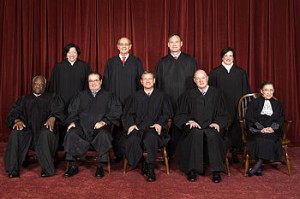 The nine justices of the United States Supreme Court are convening behind closed doors today to deliberate whether or not they will accept any of the plethora of cases that they have been petitioned to hear relating to the issue of homosexual “marriage.”
The nine justices of the United States Supreme Court are convening behind closed doors today to deliberate whether or not they will accept any of the plethora of cases that they have been petitioned to hear relating to the issue of homosexual “marriage.”
There are a reported ten cases before the court at this time, including a challenge relating to California’s Proposition 8, and several lawsuits surrounding the Defense of Marriage Act (DOMA). It is believed that the justices will accept one of the cases relating to DOMA, but there remains uncertainty over whether Proposition 8 will make the cut.
The Defense of Marriage Act, which federally recognizes marriage as being solely between a man and a woman, was signed into law by then President Bill Clinton in September 1996 after clearing the House and Senate with overwhelming support. In addition to providing a federal definition of marriage, the law bars homosexual relationships from being recognized by the IRS or the Social Security Administration, and also excludes homosexuals that serve as government workers from being recognized as a couple in order to obtain insurance benefits.
Approximately eight federal courts have ruled that portions of DOMA are unconstitutional because of the denial of federal benefits, thus increasing the likelihood that the issue will be accepted by the nation’s highest court for deliberation. Barack Obama has also been in favor of repealing DOMA, which he outlined as being part of his agenda and platform before being elected as president in 2008.
Proposition 8 also hails back to 2008, when voters in the state of California were presented with the ballot initiative of whether to enshrine marriage as being between a man and a woman in the state. The measure, which sought to add an amendment to the state Constitution declaring its support for Biblical marriage, passed by five percentage points in a vote of 52 to 47.
In 2010, District Court Judge Vaughn Walker overturned Proposition 8 in the case of Perry v. Schwarzenegger, stating that the law violated the Due Process and Equal Protection clauses of the United States Constitution. Walker placed a stay on the law, which the Ninth Circuit later upheld. In February of this year, in a 2 to 1 decision, the Ninth Circuit then agreed with Walker after hearing the case in full, resulting in a timely appeal to the nation’s highest court.
The Supreme Court rejects the majority of cases that reach its doorstep, but is more inclined to agree to hear those in which there is disagreement among the various circuit courts, of which there are 13. Cases that present a question of national importance or touch on issues that heretofore have not been addressed by the court also are more likely to be received.
As of press time, the justices did not decide on Friday to accept any of the ten appeals, but an announcement could be made on Monday about the matter.
“It did agree to rule on whether taking a human gene out of the body is a process that can be patented,” outlined SCOTUS Blog late Friday afternoon. “It also agreed to rule on legal protection for makers of generic drugs.”
If the court decides not to hear any of the cases, the lower court rulings will stand, which in most — if not all — cases would strike down the Biblical definition of marriage in the corresponding states.
Become a Christian News Network Supporter...


